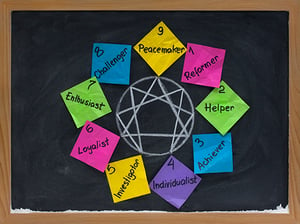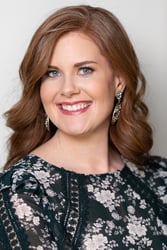Today we’re sharing insight from guest blogger Rachel Pritz, Certified Life Coach and Certified Enneagram Coach. We hope you enjoy Rachel’s wisdom and perspective.
 Rarely do you see skills like compassionate, self-aware, or emotionally intelligent show up on a resume. These are often called "soft skills", but there's nothing soft about them. It takes daily intention and effort to learn these skills. It's a journey not a destination. No book, podcast, or personality assessment will be a quick solution to building these skills. But the Enneagram personality framework can give you a starting point along with a GPS map for your journey.
Rarely do you see skills like compassionate, self-aware, or emotionally intelligent show up on a resume. These are often called "soft skills", but there's nothing soft about them. It takes daily intention and effort to learn these skills. It's a journey not a destination. No book, podcast, or personality assessment will be a quick solution to building these skills. But the Enneagram personality framework can give you a starting point along with a GPS map for your journey.
The Enneagram is a personality typing system that describes 9 different types of ways we view the world. Psychologically we created these patterns of behavior in childhood. They were meant to protect us, but as we carry these into adulthood, they can often be limitations. The Enneagram wakes you up to these patterns of behavior and helps you uncover what motivates you to behave a certain way in the first place. It shows you the good, the bad, and the ugly. It's all about dismantling the ego (aka personality) and coming out the other side with more self-wisdom and understanding of the people around us. Learning the shadow sides of ourselves can be hurtful and even downright embarrassing. But we can't make real change and grow into our full potential without being willing to get uncomfortable.
Here are 4 key areas of growth with the Enneagram can unlock in you.
1. Find your motivator
We often know our behavior is less than desirable, but it's rare that we take the time to understand why that behavior came out in the first place. Each of the 9 types has a specific core motivation or why. Knowing this can help us recognize when our ego is in the driver’s seat. It can also help us understand our triggers, which can ultimately change poor behaviors.
2. Clarity on stress and growth
The advantage of the Enneagram is that it's dynamic. It doesn't put in a box with a number. In fact, it says here's your box, but let's take the lid off, tear down the sides, and let you run. Each one of the types has specific stress and growth arrows. This means when we are stressed or growing, the behaviors of another personality type (or number) come out. This can explain why we look and even feel so different in periods of stress and growth. Why is this important? When you start to see stress behaviors, call a time out. Ask yourself how you got there? What needs to happen to get you out? When you see areas of growth, reflect on how you got there. Rinse and repeat.
3. Validates you
Good news! Nothing is wrong with you. Finding out many other people show up in the world in a similar way can be liberating. I can't tell you the number of clients that start sentences with "you are going to think I'm crazy……". My usual response is that I don't think they are crazy at all because 3 other people of their same type just told me the same thing this week.
4. Depersonalizes other people's behavior
When you learn about all the Enneagram types it helps us find grace and compassion for the unique ways we all show up. We all have core fears, core desires, and core motivations. When someone directs their poor behavior towards you it rarely has anything to do with you. Metaphorically, just pat them on the head, say awww…..you haven't done your work on this yet, and move on.
What's The Risk?
Self-awareness and empathy are two critical skills in our work environments today. We are in a human revolution. Businesses are starting to move back to focusing their attention on people. Talented people recognize this and they won't work in environments or cultures that don't support a human centered workplace. The Enneagram is the best framework I've experienced, to do just that. It challenges us to all accept and grow into the people we were born to be. It challenges us to show up as our authentic self.
This content was written and shared by Rachel Pritz.
 Rachel spent 17 years in healthcare as a bedside nurse and executive. She discovered her passion for growing and developing others through her own personal growth journey. She holds a Master’s Degree in Nursing, is a Certified Life Coach and a Certified Enneagram Coach. She coaches executives and high achievers towards finding the person they were born to be before the world got ahold of them. She has a passion for bringing the humanity back to the workplace and allowing space for all of our unique gifts and talents that will allow us to thrive both personally and professionally.
Rachel spent 17 years in healthcare as a bedside nurse and executive. She discovered her passion for growing and developing others through her own personal growth journey. She holds a Master’s Degree in Nursing, is a Certified Life Coach and a Certified Enneagram Coach. She coaches executives and high achievers towards finding the person they were born to be before the world got ahold of them. She has a passion for bringing the humanity back to the workplace and allowing space for all of our unique gifts and talents that will allow us to thrive both personally and professionally.
Connect with Rachel via LinkedIn, Facebook, and her website.



